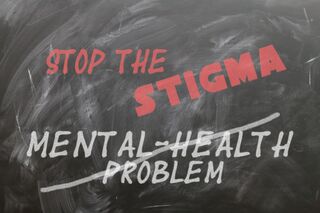Health
Can Mental Health Professionals Handle Their Own Problems?
Perceived stigma may stand in the way of disclosure.
Posted August 14, 2021 Reviewed by Vanessa Lancaster
Key points
- People with lived experience are attracted to working in mental health professions.
- A clinician's sensitivity and compassion may be improved by experiencing challenging personal circumstances.
- Concern over stigma often prevents disclosure of personal problems at work.
I had been a clinical psychologist for 25 years when my husband Paul dropped dead. We had gone swimming, as we did every Sunday morning. I waited for him in the sports center car park, but he never arrived. He died of heart failure in the changing rooms: one minute he was there, and the next minute he was gone forever.
When my three children were teenagers, we lived in a big old house, and I worked full-time as head of a large and busy child clinical psychology service. Acute anxiety, depression, and suicidal thoughts became a daily and nightly occurrence as I struggled to find a way forwards. My life was completely derailed, and I had no idea how to get it back on track again. Fifteen years later, I’m still here and able to reflect in hindsight on whether it was helpful to be a mental health professional when faced with such a major life crisis.
In some respects, my answer would be yes. My training and experience gave me the knowledge I needed to navigate the mental health services: the pros and cons of different treatments, how to access them, etc. I was almost certainly drawn to therapy as the key to processing my own trauma because my career had shown me again and again that therapy is what helps distressed people.
Over the years following Paul’s death, I worked with three psychodynamic psychotherapists and one cognitive behavioral (CBT) therapist. Because of my training, I found myself in the unique position of making an informed comparison between them.
My overwhelming conclusion, based on lived experience but concurring with the academic literature, was that the kindness and sensitivity of the person sitting opposite me (those elusive ‘therapist variables’) matter far more than the type of therapy being practised. As the psychotherapist Valery Hazanov puts it: "Conceptualisations, theories, interventions…only matter if the patient remembers a person, something that a person said or did for her that was real." It felt very different being on the receiving end of these different types of therapy.
A second, more surprising source of strength was the wealth of clinical material I could access from my own patients. As soon as the tables were turned and I was the one in need of help, I began to see that my patients could show me many different ways of dealing with loss and trauma.
One example was a support group I ran for the parents of preschool children who were being assessed for autistic spectrum conditions. These parents all shared the experience of losing the child they had anticipated when confronted with an autism diagnosis. Yet, their reactions to this varied widely from denial and shock ("You can tell me anything but just don’t tell me he’s autistic"), sadness, loneliness ("My family and friends don’t understand what I’m going through"), anger and blame ("Those bastard MMR vaccine manufacturers are harming all our children") and, in rare cases, early acceptance and a desire to get on with life ("He hasn’t changed at all just because he’s been given a diagnosis; he’s still my lovely boy").
Apart from acceptance, I had felt all of these emotions since Paul died. But as the weeks went by and I watched the parents bravely inching their way towards a more hopeful future despite their loss, I started to believe that I could do it too. I’m convinced that I also became a better, more sensitive clinician. After Paul died, something shifted, and my experience of the group’s anguish and sense of loss was no longer drawn from the pages of a textbook but rooted deep within me.
It was not until I had a publishing deal for the book I had been writing about my bereavement, and I read an article by Tay and her colleagues, that I did a sudden double-take about whether being a mental health professional had really helped me to face my own life crisis. Tay found that although mental health problems are relatively common amongst clinical psychologists, the majority are reluctant to disclose these to colleagues and superiors due to perceived stigma, fears of being judged negatively, and shame.

It occurred to me that I had decided to access therapy privately, without even considering the free NHS option: Why? Why had I told none of my work colleagues or my manager about the anxiety and depression I was experiencing or the therapy I was having? Why did I wait until I had almost retired from my NHS post before writing about my experiences? Why was I so anxious about the publication of my book?
Clearly, I had backed away from disclosure without even being aware that this was what I was doing. As Tay says:
Even at training level there is an emphasis on emotional resilience and an unspoken belief that disclosing one’s mental health problems may be viewed with mistrust and could result in discrimination.
Had I been younger and less established in my career, this would undoubtedly have mattered even more.
It is known that people with lived experience are more likely to be attracted to working in the field of mental health in the first place. If we are better able to show compassion to our patients as a result of this, we need to be a bit better at showing compassion towards ourselves?
Reflecting on my own experience, it’s a pity that I felt unable to be open about what I was going through with my work colleagues, nor turn to the service in which my whole career had taken place for help. Tay contends that the health service culture of non-disclosure needs to change "…to encourage open conversations about the lived experience in the workplace, with the aim of reducing stigma and shame associated with these."
References
Hazanov, V. (2019). The Fear of Doing Nothing: Notes of a Young Therapist. Sphinx.
Tay, S., Alcock, K. & Scior, K. (2018). Mental health problems among clinical psychologists: Stigma and its impact on disclosure and help-seeking. Journal of Clinical Psychology, 74, 1545-1555.




